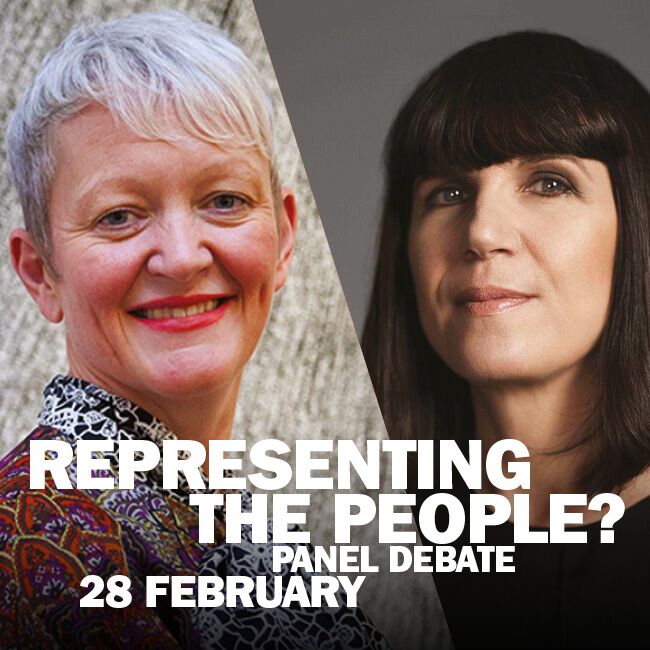Recognising the centenary of the Representation of the People’s Act and International Women’s Day, The Attenborough Centre for the Creative Arts invited four alumnae of Sussex University to discuss the changes since the act.
Four influential women were invited to discuss their shared history with the University of Sussex on Wednesday 28th February. Not only did this event mark the centenary of many women’s right to vote in the UK, but it has arrived at a turning point in gender politics. In a post-Weinstein epoch, we are drenched in an atmosphere of scandal, exposing the persistent cruelty of some men to women.
The symposium commenced with an introduction from our Vice Chancellor, Adam Tickell. Perhaps he was not a totally suitable choice for the evening’s celebration of women – particularly as he pronounced Maria Balshaw’s name incorrectly – but it was a minor component of the whole event.
The conversation, led by the ACCA’s Creative Director, Laura McDermott, hosted a panel of four Sussex alumnae who shared how their involvements within their spheres of interest, which has made them role models. On the far right sat Catherine Mayer, an author, journalist, and co-founder of the Women’s Equality Party. In between her and Laura was Helen Pankhurst, senior advisor of CARE International and of course the great-granddaughter of Emeline Pankhurst and the granddaughter of Sylvia Pankhurst.
On the other side of Laura, Maria Balshaw, an art director of many galleries who now resides as the Director of the Tate art museums and galleries. Finally, on the far left was Dr Philippa Gregory, writer and broadcaster known for her best-selling novel, The Other Boleyn Girl.
The women were all asked how their experiences at Sussex shaped their path into their respective fields. Catherine and Maria both touched on how their political and world views were challenged through their time spent at university. Catherine through her activism, even occupying campus buildings, and Maria through academics facilitating a newfound exploration of culture and identity. Helen and Catherine praised ERASMUS and their opportunities to spend a year abroad, a prospect that has some under threat for many by Brexit. Although Philippa found her place through history electives in her English degree. She said: “I need to know where everything came from because that will tell me where we are now”.
One particular point of discussion that struck me was the discussion in the media of Maria being the first female Tate director. This acknowledgement of surprise should not have been allowed to happen in the Tate’s 120 years as an art company as more women dominate the museum and artistic field than men. Similarly, Catherine criticised why jobs of a higher degree have “female” or “woman” adjoined to their title. She also discussed anecdotally about how her biography about Prince Charles launched her writing career; however, any thoughts about Catherine’s desire to write about Angela Merkel had been shut down, as many publishing houses believe that biographies centring around women do not sell as much as those about men.
The floor was opened up to questions from the audience, in which the first woman chosen discussed a campaign for a proposed blue plaque to commemorate suffragettes that protested from Brighton. Although a worthy point of cause, the statement made by the woman was moved quickly on by Laura.
During the last few minutes of the discussion, Catherine acknowledged how the temporal perimeters of the evening meant that it was very much rooted within one feminist perspective. Although seeing these powerful alumnae in front of me was a poignant moment, I believe the conversation was somewhat restricted by the lack of intersectionality. Only one facet of feminism was embellished – the White Woman.
Through the progression of feminist philosophy, we understand that the rights of women extend beyond what the suffragette was trying to achieve. Although the fundamentals were there 100 years ago, discussion surrounding gender equality has now progressed to include race, class, and sexual politics, all of which were generally missing from discussion. Though, Maria recognised how the younger generations are beginning to reject and challenge binary thinking and criticise positions of privilege to allow for other voices to be heard.
Although any form of dialogue is an essential stimulant for societal change, so is action. The women (and some men) that attended the event are already socially conscious of the action that needs to continue if there is to be progression towards gender equality. The next step forward is using our knowledge and sharing it with others who may be misinformed about feminism. I still know some men and even women who firmly believe that feminists are a group of bra-burning, misandristic radicals. It is our responsibility to deconstruct these assumptions.
The four women joined everyone afterwards in the ACCA’s café bar talk to audience members and sign discounted copies of books by some of the women in partnership with Brighton’s City Books.
The ACCA has celebrated the significance of this pinnacle centenary for women. The panel even prophesised the next decade as a period for substantial change before we reach a new centenary – the Equal Franchise Act. I hope that the audience came away from that discussion with a similar sentiment to me; optimism and excitement for the possibility of progression for gender equality within our life time. Helen discussed an ‘elastic band theory of change’; if we don’t continue to pull and persist for change then it will just spring back to the way things were before.

